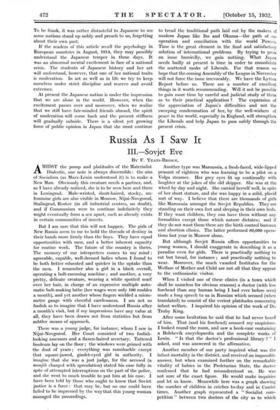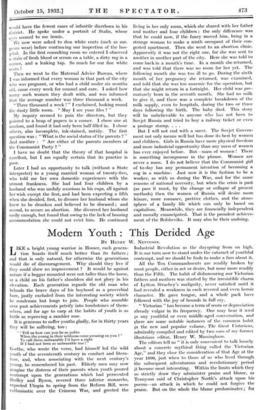Russia As I Saw It
III.—Sovjet Eve BY F. YEATS-BROWN.
AMIDST the pomp and platitudes of the Materialist Dialectic, one note is always discernible : the aim of Socialisin (as Marx-Lenin understood it) is to make a New Man. Obviously this creature needs a partner, and, as I have already noticed, she is to be seen here and there in Leningrad. Male-wristed, short-haired, stocky, un- feminine girls are also visible in Moscow, Nijni-Novgorod, Stalingrad, Rostov (in all industrial centres, no doubt), and if Communism were to continue indefinitely they might eventually form a sex apart, such as already exists in certain communities of insects.
But I am sure that this will not happen. The girls of New Russia seem to me to hold the threads of destiny in their hands more firmly than the boys. They have equal opportunities with men, and a better inherent capacity for routine work. The future of the country is theirs. The memory of our interpreters comes to my mind : agreeable, capable, well-dressed ladies whom I found to be both better educated and quicker in the uptake than the men. I remember also a girl in a black overall, operating a bolt-ramming machine ; and another, a very pretty, delicate creature, wearing a white spotted scarf over her hair, in charge of an expensive multiple auto- matic bolt-making lathe (her wages were only 100 roubles a month), and yet another whose fingers wielded a micro- meter gauge with cheerful carelessness. I am not so foolish as to imagine that I have understood Russia after a month's visit, but if my impressions have any value at all, they have been drawn not from statistics but from subtler means of approach.
There was a young judge, for instance, whom I saw in Nijrii-Novgorod. Her Court consisted of two foolish- looking assessors and a flaxen-haired secretary. Tattered linoleum lay on the floor ; the windows were grimed with the dust of years ; everything was ramshackle except that square-jawed, gimlet-eyed girl in authority. I imagine that she was a just judge, for the accused (a inoujik charged with speculation) stated his -case fully in spite of attempted interruptions On the part of the pollee, and she went to much trouble to put him at his ease: I have been told by those who ought to know that Soviet justice 'is a farce : that may be, but no one could have failed to be impresied by the way that this young woman managed the proceedings. Another type was Maroussia, a fresh-faced, wide-lipped peasant of eighteen who was learning to be a pilot on a Volga steamer. Her grey eyes lit up continually with laughter at the jokes of the old skipper. She was at the wheel by day and night. She carried herself well, in spite of her short stature, and she was happy in a solid, placid sort of way. I believe that there are thousands of girls like Maroussia amongst the Sovjet Republics. They are standing on their own feet and sleeping in their own beds. If they want children, they can have them without any formalities except those which nature dictates ; and if they do not want -them there are the birth control bureaux and abortion clinics. The latter performed 80,000 opera- tions last year in Moscow alone.
But although Sovjet Russia offers opportunities to' young women, I should exaggerate in describing it as a paradise even for girls. There is practically nothing to eat but bread, for instance ; and practically nothing to wear. Moreover, the much vaunted Institutes for the Welfare of Mother and Child are not all that they appear to the enthusiastic visitor.
When I visited one of these clinics (in a town which shall be nameless for obvious reasons) a doctor (with less forehead than any human being I had ever before seen) made a long speech to us in Russian which seemed (when translated) to consist of the veriest platitudes concerning infant welfare. I inquired his opinion of the work of Dr. Truby King.
After some hesitation he said that he had never heard of him. That (and his forehead) aroused my suspicions. I looked round the room, and saw a book-ca.se containing a Bolshevik encyclopaedia and the complete works of Lenin. " Is that the doctor's professional library ? " I asked, and was answered in the affirmative.
Another member of our party inquired what was the infant mortality in the district, and received an impossible answer, but when examined further on the remarkable vitality of babies in the Proletarian State, the doctor confessed that he had misunderstood us. He was not sure of the exact figure. He would make inquiries and let us know. Meanwhile here was a graph showing the number of children in creches to-day and in Czarist times. Another graph represented a " Socialist com- petition*" between two doctors of the city as to which would have the fewest cases of infantile diarrhoea in his district. He spoke under a portrait of Stalin, whose eves seemed to me ironic.
We now were asked to don white coats (such as sur- geons wear) before continuing our inspection of the hos- pital. In the first consulting room we entered I observed a stain of fresh blood or serum on a table, a dirty rag in a corner, and a leaking tap. So much for our fine white coats !
Then we went to the Maternal Advice Bureau, where I was informed that every woman in that part of the city who was pregnant, or who had a child under six months old, came every week for counsel and care. I asked how many such women they dealt with, and was informed that the average number was three thousand a week.
"Three thousand a week ! " I exclaimed, looking round the dusty little room. " May I see your files ? "
My inquiry seemed to pain the directors, but they pointed to a heap of papers in a corner. I chose one at random, and found it had only been half filled in. I chose others, also incomplete, ink-stained, untidy. The first question was : " What is the social status of the parents ? " And another : " Are either of the parents members of the Communist Party ? "
I have no doubt that the theory of that hospital is excellent, but I am equally certain that its practice is poor.
Later I had an opportunity to talk (without a State interpreter) to a young married woman of twenty-five, who told me her own domestic experiences with the utmost frankness. She- had had four children by a husband who was unduly uxorious in his cups, all against her wish except the first, and had been expecting a fifth when she decided, first, to divorce her husband whom she knew to be drunken and believed to be diseased ; and second, to secure an abortion. She divorced her husband easily enough, but found that owing to the lack of housing accommodation she could not evict him. He continued living in her only room, which she shared with her father and mother and four children : the only difference was that he could now, if the fancy moved him, bring in a strange woman to make a ninth occupant of their con- gested apartment. Then she went to an abortion clinic. Apparently it was not the right one, for she was sent to another in another part of the city. Here she was told to come back in a month's time. In a month she returned, and was told that there was no room for her yet. The following month she was too ill to go. During the sixth month of her pregnancy she returned, was examined, and told that she was too anaemic for the operation, but that she might return in a fortnight. Her child was pre- maturely born in the seventh month. She had no milk to give it, and there was a complete breakdown of the milk supply, even to hospitals, during the two or three days following the birth. The baby died. This story will be unbelievable to anyone who has not been to Sovjet Russia and tried to buy a railway ticket or even a postage stamp. . . .
But I will not end with a sneer. The Sovjet Govern- ment not only means well but has done its best by women and children. Girls in Russia have more physical freedom and more industrial opportunity than any mass of women has ever enjoyed before. But—mass of women ! There is something incongruous in the phrase. Women are never a mass. I do not believe that the Communist girl of to-day has any permanent intention of becoming a cog in a machine. Just now it is the fashion to be a worker, as with us during the War, and for the same reasons of national necessity, but when the crisis is past (as pass it must, by the change or collapse of present methods) then the women of Russia will desire more leisure, more romance, prettier clothes, and the atmo- sphere of a family life which can only be based on capitalism. Meanwhile, they are financially independent and morally emancipated. That is the proudest achieve- ment of the Bolsheviks. It may also be their undoing.



























































 Previous page
Previous page